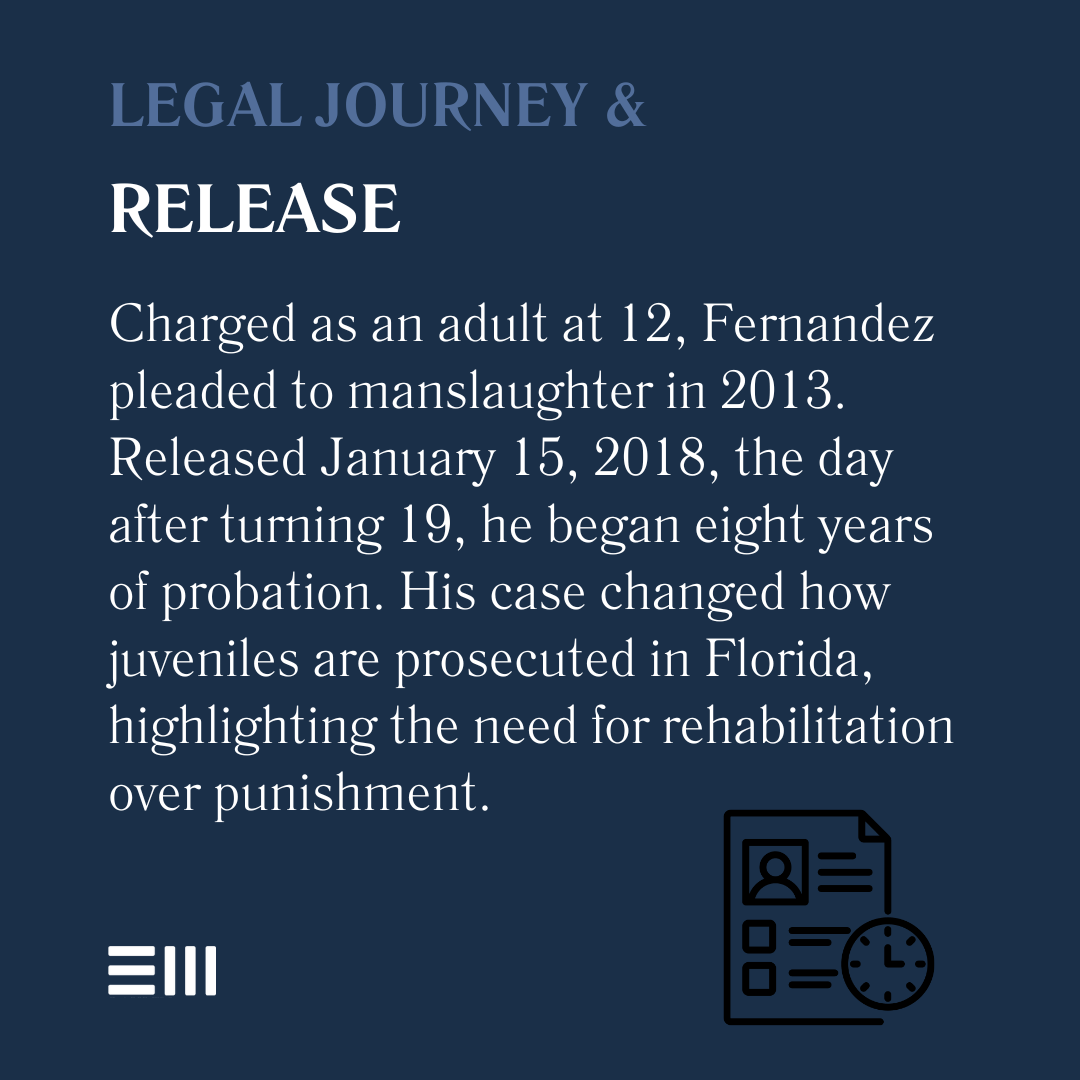In 2011, the American justice system faced one of its most troubling dilemmas when Cristian Fernandez, just 12 years old, became the youngest person in Jacksonville history to be charged as an adult with first-degree murder.
His case sparked national debate about juvenile justice, the treatment of child defendants, and the complex intersection of trauma, violence, and criminal responsibility.
A Childhood Punctuated by Violence
Fernandez's life story reads like a case study in childhood trauma. Born in Miami in 1999 to a 12-year-old mother who had been sexually assaulted by his 25-year-old father, Fernandez's earliest years were marked by neglect and instability.
At age two, he was discovered wandering naked and dirty on a South Florida street while his grandmother used cocaine in a nearby motel room.
The pattern of neglect and abuse continued throughout his childhood. By age eight, he had been sexually assaulted by an older cousin. Later, he endured physical abuse from his stepfather, who eventually committed suicide when police were on their way to arrest him for beating Fernandez so severely that his eye was damaged.
"You got to suck up feelings and get over it," Fernandez once told a counselor, revealing the emotional detachment he had developed as a survival mechanism.
The Crime and Charges
In March 2011, Fernandez's 2-year-old half-brother, David Galarraga, died from head injuries after Fernandez allegedly slammed the toddler's head into a bookshelf.
Then-State Attorney Angela Corey made the controversial decision to charge the 12-year-old as an adult with first-degree murder, a charge that could have resulted in a life sentence.
Compounding the tragedy, Fernandez's mother, Biannela Susana, waited nearly eight hours before seeking medical help for the unconscious toddler.
Medical experts later testified that the boy might have survived had he received immediate medical attention. Susana was charged with aggravated manslaughter and eventually pleaded guilty.
Legal Complexities and Landmark Changes
Fernandez's case immediately highlighted gaps in the justice system's handling of juvenile defendants in adult courts. A key turning point came when Judge Mallory Cooper ruled that police interrogations of Fernandez were inadmissible because the boy couldn't knowingly waive his rights to remain silent and consult an attorney.
Further legal complications arose when the U.S. Supreme Court ruled in 2012 that mandatory life sentences without parole for juvenile offenders were unconstitutional. This created uncertainty about what sentence Fernandez might face if convicted.
In 2013, after a high-profile legal battle, Fernandez's defense team, which included several prominent attorneys working pro bono, including Melissa Nelson (who would later defeat Corey to become State Attorney) and Hank Coxe, secured a plea deal.
Fernandez pleaded guilty to manslaughter and aggravated battery and received juvenile sanctions rather than facing trial as an adult.
Confinement and Support
From 2013 until his release on January 15, 2018 (the day after his 19th birthday), Fernandez was held at Cypress Creek Juvenile Offender Correctional Center in Lecanto, Florida. During this time, he found an unlikely support system in Mary Coxe, wife of attorney Hank Coxe, who became Fernandez's court-appointed guardian ad litem and "honorary grandmother."
For over two years, Coxe made the 132-mile journey every Saturday to spend three hours with Fernandez. "I tell him I love him no matter what, and that I believe God loves and forgives him no matter what, so he can maybe love and forgive himself," Coxe said in an interview.
While incarcerated, Fernandez pursued his education, received trauma-focused cognitive-behavioral therapy, and, according to those who worked with him, showed signs of growth and rehabilitation.
Release and Probation
Upon his release in 2018, Fernandez began serving up to eight years of probation. The conditions included maintaining a residence, holding a job, continuing with therapy, and having limited contact with minors.
However, just before his release, a judge temporarily suspended some of these conditions after his attorneys argued they had become "unrealistic and problematic."
Legacy of the Case
The Fernandez case fundamentally changed how juveniles are prosecuted in Duval County and contributed to the national conversation about juvenile justice reform.
It raised difficult questions about culpability, punishment, and rehabilitation when dealing with children who commit serious crimes, especially those who have themselves been victims of abuse and neglect.
As law and safety expert Dale Carson noted, "He was abused when he was younger, and in turn abused others, and you can't simply go back, even if you incarcerate someone for seven years, like in this case, you can't fix that."
The case also demonstrated how high-profile legal advocacy can dramatically alter outcomes in the justice system. Without the pro bono "Dream Team" that took over his defense, Fernandez might well have spent his life in adult prison.
Today, as Fernandez continues his journey into adulthood under the conditions of his probation, his case stands as a sobering reminder of the complex challenges faced by children caught in cycles of violence and trauma, and the ongoing struggle to create a juvenile justice system that balances accountability with compassion and rehabilitation.
Equitable treatment of heirs in Etowah County, AL often involves balancing business interests with other assets. Life insurance, non-business assets, or structured buyout arrangements can help provide fair treatment while maintaining business integrity.
Protecting Your Family's Rights in the Legal System
Cases like Cristian Fernandez's highlight the importance of experienced legal representation, especially when dealing with complex family law and juvenile justice issues.
Having knowledgeable legal counsel can make a significant difference in case outcomes.
Contact Baxley Maniscalco for Legal Support
Baxley Maniscalco serves clients across the state of Alabama with attorneys experienced in family law matters. Their practice areas include divorce, child custody and visitation, adoption, and other family law concerns.
The firm's attorneys work hard to achieve results for their clients and are available to answer questions throughout the legal process.
For assistance with family law matters in Alabama, schedule a consultation with Baxley Maniscalco by calling (256) 770-7232.


